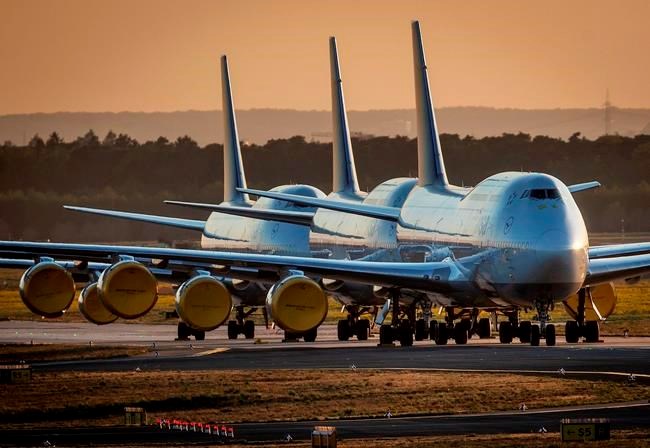Boeing outlined plans Wednesday to cut 10% of its workforce, slow production of new planes and raise more cash to survive a downturn in business that started with the grounding of its
Executives said the job cuts would be accomplished through attrition, paying people to leave, and layoffs.
Boeing began the year with about 161,000 employees.
Boeing announced the moves as it reported a first-quarter loss of $641. It earned $2.15 billion in the same period last year. Revenue fell 26%, to $16.91 billion.
The job cuts will be deepest — more than 15% — in the large division that makes airline jets, which has assembly plants in the Seattle area and South Carolina. Deliveries of those planes have plummeted by two-thirds in 2020, compared with a year earlier. Boeing’s
“I know this news is a blow during an already challenging time," CEO David Calhoun said in a memo to employees. "I regret the impact this will have on many of you. I sincerely wish there were some other way.”
Calhoun told reporters the job cuts would hit white-collar employees more than production workers, and would carry the company into 2022.
Boeing's airline customers are staggering under an unprecedented decline in air travel because of the virus pandemic.
Global air travel fell 53% last month compared with March 2019, the largest drop in recent history and a return to levels not seen since 2006, the International Air Transport Association, an airline trade group, said Wednesday. Nearly two-thirds of the passenger jets around the world have been idled, according to aviation data firm Cirium.
Boeing’s European rival, Airbus, reported a first-quarter loss of 481 million euros ($515 million). Airbus recently decided to cut production of jetliners by about one-third, and CEO Guillaume Faury said Wednesday that the company – which has already furloughed more than 6,000 workers – will study further “resizing” when the post-pandemic size of the airline industry is more clear. That is a worrying prospect on a continent where Airbus has factories in four countries.
“We are still at an early stage of this crisis,” said Faury, who called it the gravest situation ever for the aerospace industry.
General Electric Co.’s aviation business, which makes jet engines and is the conglomerate’s largest division, saw first-quarter profit fall 39%.
“We are facing significant headwinds in aviation, and we may be for a while,” GE CEO Lawrence Culp told analysts.
Airline customers are asking the aircraft makers for delays in receiving new planes, which Airbus called its biggest current issue. Boeing's biggest customer, Southwest Airlines, is negotiating to cut deliveries through 2021 by more than half. With airlines flying fewer planes, Boeing's service business has dropped too.
“The aviation industry will take years to return to the levels of traffic we saw just a few months ago,” Calhoun said.
To reach that turnaround, Boeing will cut production of its 787 jets in half by 2022 and also build fewer 777s. The company said it will resume production of the grounded 737 Max at “low rates” this year, gradually rising to 31 a month next year. Boeing was building 52 Max jets a month before regulators around the world grounded the plane in March 2019 after two crashes that killed 346 people.
After another delay, Boeing now expects to get federal approval to resume deliveries of Max jets before the end of September.
Chicago-based Boeing is also considering applying for a federal loan made possible by last month’s $2.2 trillion virus-recovery measure. Calhoun said the company could turn to private sources instead, a move that would avoid giving the government an equity stake in Boeing.
The company ended March with $15.5 billion in cash, up from $10 billion three months earlier, but piled on $11.6 billion in new debt, which now totals $38.9 billion.
The company has reduced spending, and over the weekend, it terminated a deal with Brazilian aircraft maker Embraer SA, which analysts said will help Boeing conserve cash but weaken its position against Airbus in the market for smaller passenger jets.
The virus hit Boeing production workers last month, forcing the company to temporarily shut down assembly lines in Washington state and South Carolina. The Seattle-area plants are beginning to resume activity, and workers are scheduled to return to the South Carolina plant beginning Sunday night under new social-distancing rules.
Boeing was in financial trouble before the virus outbreak, however. The grounding of the Max added billions in costs and cut deeply into revenue last year, leading to Boeing’s first money-losing year in two decades. The company faces criminal and civil investigations and a flurry of lawsuits by families of the people killed in the crashes.
Shares of Boeing climbed nearly 6% on Wednesday to close at $139. Even with the rally, however, they have dropped 57% so far this year, mirroring the plunge in airline stocks.
___
Angela Charlton in Paris contributed to this report.
David Koenig, The Associated Press




